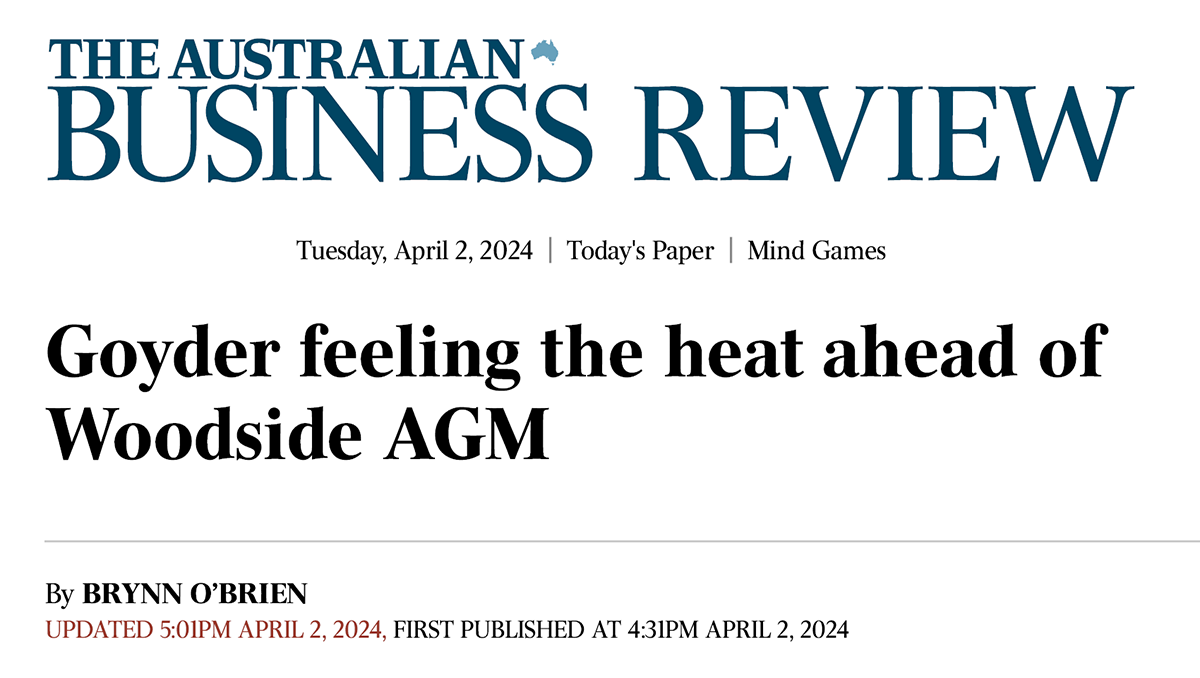Investor Insight Editorial: Goyder feeling the heat ahead of Woodside AGM
This article by Executive Director, Brynn O’Brien, was first published on 2 April 2024 in The Australian.
As a company Chair, Richard Goyder knows very well what a shareholder rebellion looks like - only last year, he was forced to announce his early retirement as Chair of Qantas after months of turmoil at the airline. So it’s not surprising he is now, just weeks out from a shareholder vote on his re-election as chair of oil and gas company Woodside, making a bid to soothe investors and keep his job.
The stakes are high for the Woodside board at its upcoming annual general meeting. Over the past four years, Woodside has faced wave after wave of investor dissent. Primarily, because it has failed to deliver a credible strategy that will maximise shareholder value in the face of the global energy transition, and failed to be responsive to shareholder concerns.
Writing in yesterday’s Australian Financial Review, Goyder makes a number of questionable claims, the most astonishing of which is this: “Woodside… is implementing a plan that we believe is Paris-aligned.” If Goyder and his fellow directors actually believe this, the board is in even worse shape than we thought.
So how does Woodside’s plan fail the Paris-alignment test? Let me count the ways.
First, Woodside is continuing to allocate the majority of its capital to developing new oil and gas projects. Having not sanctioned a significant ‘new energy’ project, all of Woodside’s capex has been allocated to oil and gas expansion. ACCR’s analysis demonstrates that not one of Woodside's projects awaiting final investment decision is Paris-aligned.
Second, Woodside’s scope 1 and 2 decarbonisation targets fall well short of any credible take on Paris-alignment. The International Energy Agency says that the oil and gas sector should be aiming for a 60% reduction in operational emissions from today’s levels by 2030 in order to be aligned with a 1.5C pathway. Woodside is hoping a mere 30% will do the trick. To add insult to injury, the company intends to primarily rely on offsets to “meet” this insufficient target.
Third, Woodside has not set a scope 3 target to drive the decarbonisation of its products and value chain. Scope 3 emissions -- the emissions from burning oil and gas -- are 92% of Woodside’s equity emissions. As long as Woodside continues to actively develop projects that will result in an additional 475 MtCO2e of scope 3 emissions, there is no pathway for the company to set a credible Scope 3 target. Rather than dealing with this, Goyder’s board abdicates responsibility for the company’s biggest problem.
Woodside’s CEO, Meg O’Neill, said on a number of occasions recently that the company relies on “science”. Is Woodside aware that the remaining carbon budget for a 50% chance of limiting warming to 1.5C is only about five years’ worth of emissions from 2024, at current rates?
But don’t just take my word for it, take the word of the investor-led Climate Action 100 benchmark, which has found that Woodside’s targets, capital allocation and decarbonisation strategy do not meet the goals of the Paris Agreement. And for the cherry on top, ACCR’s analysis shows that all this high risk, high emissions growth is not even financially attractive: Woodside’s carbon-intensive growth portfolio will deliver less value than a share buyback would.
Goyder’s intervention aims to relieve just enough investor pressure ahead of Woodside's upcoming AGM. Hoping, perhaps, to avoid a repeat of AGMs past.
In 2022, just shy of half of Woodside’s shareholders rejected the company’s climate plan in a non-binding shareholder vote. The plan produced in 2023 saw no material changes, leading to a 35% shareholder vote against the re-election of incumbent director Ian Macfarlane. This year was an opportunity for Woodside to demonstrate it could be responsive to investor feedback. But instead, it produced a climate plan with little more than tweaks and a change of tone. This is a board with a determination to bet shareholder money against a rapid and orderly energy transition, without any sign of a Plan B.
Rather than mustering a substantive response to shareholder concerns, Goyder is digging in. Media reported last month that superannuation fund HESTA, which holds 0.8% of Woodside shares and sits in the top twenty of the company’s shareholders, had “put forward director candidates for Mr Goyder to consider”. Those efforts appear to have been dismissed; the company’s notice of meeting contained no new director candidates.
Investors need confidence that boards of carbon-intensive companies have the right mix of skills and judgement to serve long term shareholder interests in the energy transition. In pinning his colours to the mast in this way, perhaps Goyder has done investors a favour. There can now be no doubt: Goyder lacks the leadership style for a company in need of such major energy transition plumbing.
At the upcoming AGM, a vote against yet another woeful climate plan and the chair who delivered it is not only justified, but necessary.
Please read the terms and conditions attached to the use of this site.
